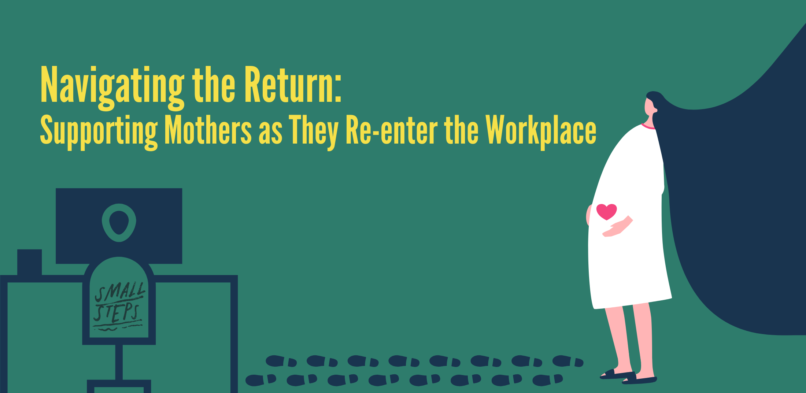Navigating the Return: Supporting Mothers as They Re-enter the Workplace

Navigating the Return: Supporting Mothers as They Re-enter the Workplace
February 28, 2024 No Comments on Navigating the Return: Supporting Mothers as They Re-enter the WorkplaceWith Women’s Day around the corner, and the UN focusing on investing in women to accelerate progress, there continue to be challenges for women in the workforce.
Returning to work after maternity leave presents a whirlwind of emotions and logistical challenges for many women. The mental transition from full-time caregiver to working professional can be daunting, exacerbated by potential biases or outdated expectations within the workplace. Let’s dive into the complexities mothers navigate and how organizations can foster a smooth, supportive re-entry into the workforce.
The Inner Dialogue: A Mix of Emotions
As a mother prepares to return to work after a 6-month maternity leave, a complex blend of emotions may take over:
- Excitement and Anticipation: The prospect of engaging with familiar work projects and interacting with colleagues can be invigorating.
- Guilt and Apprehension: Many working mothers struggle with leaving their child in another person’s care, worrying about balancing the demands of work and motherhood.
- Determination and Focus: There’s a strong desire to prove competency and pick up their careers from where they left off.
These feelings are natural and a testament to a mother’s dedication to both her child and career.
Casual Bias: Challenges from Colleagues
Unfortunately, some workplaces still retain outdated mindsets that can make a mother’s return more difficult. Examples of this include:
- Assumptions of Reduced Commitment: Colleagues may unconsciously presume the mother’s priorities have shifted entirely towards her child, causing them to question her ambition or availability.
- Subtle Exclusion: Mothers can be unintentionally left out of critical meetings or informal decision-making processes.
- Insensitive Comments: Joking remarks about “mommy brain”, “just back from a break” or questioning a mother’s ability to manage work and family life can be both hurtful and demoralizing.
These biases, however subtle, highlight the need for greater sensitivity and understanding of the challenges faced by working mothers.
How Organizations Can Bridge the Gap
Organizations hold a responsibility to create a supportive and welcoming environment for mothers who are returning to work. Key strategies include:
- Flexible Work Options: Phased return programs, flexible hours, or telecommuting options ease the transition back to full-time work, allowing mothers to balance childcare needs.
- Leadership Support: Visible support from managers and senior leadership communicates organizational commitment to working mothers, creating a culture of inclusion.
- Mentorship Programs: Connecting returning mothers with mentors offers guidance and helps navigate workplace dynamics.
- Open Communication Channels: Encourage open communication and feedback to tackle any potential challenges proactively and collaboratively.
Evidence-based Actions
Companies like Google, Adobe, and Intel have implemented innovative support programs for mothers returning to the workforce. These include extended maternity leave, on-site childcare facilities, and specialized workshops focused on addressing re-entry concerns. Studies in organizational psychology and Human Resources have shown that companies promoting family-centric policies experience increased retention rates, higher employee morale, and reduced overall turnover.
The Path Forward
Re-entering the workforce after maternity leave is a transformative experience for women. As men and women work shoulder to shoulder in today’s corporate world, it is important to understand the emotional complexities, confronting subtle biases, and proactively implementing supportive policies, organizations can empower women to excel as both mothers and professionals. Creating an inclusive workplace ultimately benefits entire organizations through increased productivity, loyalty, and talent retention.
Let’s strive for workplaces where motherhood and a fulfilling career can harmoniously coexist.

Leave a comment